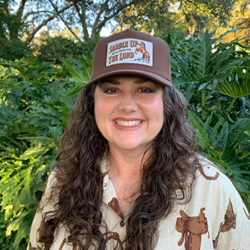 We sat at lunch and she shared with great excitement news of her new job earning twice her previous salary.
We sat at lunch and she shared with great excitement news of her new job earning twice her previous salary.
This was her ticket to finally getting out of debt, she said. She was going to live as though she was still earning only her previous salary and use the extra income to eliminate debt.
I felt relief over her plan for getting out of the financial hole she had been digging for years.
Months later, I tried to keep my hopes up when she told me she had splurged on Christmas gifts, but was buckling down in the new year.
Months later, she filed for bankruptcy.
We both went through Financial Peace University and received the same information. How was I able to use that information to become debt-free, and she went bankrupt?
That question plagued me. Then one day I turned it around on myself. How is it that I can be disciplined when it comes to finances, but I can’t apply that same concept to diet and exercise, even though I tell myself and others that my health is important to me?
After contemplating that question for months, I went in search of answers.
Understanding Your Brain
Understanding what’s going on with your brain is key, said Kim Uzzell, a financial psychologist and founder of The Financial Wellbeing Academy.
One part of the brain takes something as fact. Another part interprets the emotion that’s attached to the fact.
“We know the logic, but the emotion is the driver,” Uzzell said.
Most of us understand the benefit of saving for the future but the emotional part of our brain takes in all the money stories we were surrounded by growing up: A mom who stressed about money; an uncle who lost a business; a friend’s dad who lost his job and the family lost their home.
Those stored memories often “will come out to counter your knowledge when you have a financial decision to make,” Uzzell said.
Many clients claim they know what changes they want, yet they don’t follow through with the required actions.
Uzzell coaches people in those situations to help reveal the “why” behind the behavior. Sometimes it’s a person who’s trying to make up for something that their parents didn’t do. Sometimes the actions are an emotional response to something tragic.
“Once you get it, you can layer on new behaviors and rewire those pathways,” Uzzell said.

Three Pillars
Money Relationships Are Based on Three Pillars, said Erika Wasserman, a certified financial therapist with Your Financial Therapist.
Background
How was money talked about in your home? Wasserman’s dad talked to her frequently about financial topics. He asked her math questions when they shopped. The messaging she got was to only buy at discount shops, she said as she laughed.
Wasserman had a client who “went camping” several times a year as a child. The twist: the camping happened at home when the lights got turned off due to an unpaid utility bill. The parents described the situation as camping, perhaps to make it less fearful for their children.
Some adults come from backgrounds where they heard repeatedly that their parents didn’t have enough money to invest, or that financial advisors only worked with the ultra-rich.
Religion and Culture
These factors play a part in our money mindset because money sometimes is viewed as greed. Some religions promote giving a percentage of income to church or a charity. Some cultures promote supporting family members no matter what. In some cases, that could mean that we are our parents’ retirement plan.
Experiences
When you have a positive experience with almost anything, you’re likely to do it again. You go to the farmers’ market in town and find all the fresh vegetables you want. You’re likely to return. If you don’t find what you need, you might not go back. The same is true for money experiences. If you go to a financial advisor and have a bad experience or feel like you can’t trust the advice, you may not try that again.
Overcoming Financial Hurdles
 Here’s the part, dear reader, where I must admit some disappointment with my experts’ information. There seems to be no quick approach to fixing poor financial behavior. I had hoped there would be, and that I could share that advice with prospective clients who aren’t well-positioned for retirement yet.
Here’s the part, dear reader, where I must admit some disappointment with my experts’ information. There seems to be no quick approach to fixing poor financial behavior. I had hoped there would be, and that I could share that advice with prospective clients who aren’t well-positioned for retirement yet.
Lots of people are knowledgeable of their jobs but feel embarrassed by how little they understand investing. Some are ashamed about their relationship with money.
“When you feel this way, you may push it down the priority list,” Wasserman said. “The intention is there, but it gets down to execution.”
Wasserman said to start small, but start. She likened it to starting any new hobby. Mistakes will be made, but practice brings improvement.
You Don’t Have to DIY it
Dave Ramsey recommends finding an advisor with the heart of a teacher. I am happy to answer questions and offer advice to get you on the right path regarding your investments. Please contact me if you’d like to learn more.
June 2025




